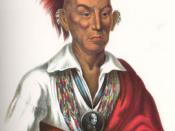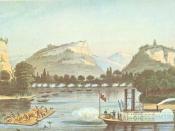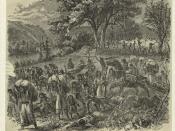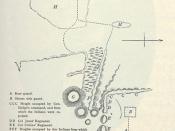The Unnecessary War Against Black Hawk The Black Hawk war was itself only 15 weeks long and only 70 settlers and soldiers died as a result from it. But the roots of it are much more complex than that. The first act that the start of the war could be traced back to would be the Winnebago War. This "war" was nothing more than an Indian scare, just the first since 1812. What happened was that the Winnebago killed two white men because they feared, and rightly so, that they were being pushed off of their hunting ground. Black Sparrow Hawk, commonly known as just Black Hawk, was not even a chief at the time. He just led a band of Sauk Indians called a "British Band". He complained openly about the 1804 treaty where some Sauk and Fox chiefs signed away fifty million acres for a thousand dollar annuity.
In 1831 the tribe needed a corn crop and ordered squatters to leave and burned the isolated cabins in their region. Gov. Reynolds called out a volunteer army of 700 men, and joined with regulars under Gen. Edmund P. Gaines. Under the threat, Black Hawk withdrew and promised not to return to Illinois without permission. Not long after he returned with 500 braves and 1000 squaws and children to plant some corn because the land that was given to them was not cut for growing. Reynolds called out the militia army against the perceived threat and under the threat Black Hawk sent out a flag of truce. Unfortunately, he sent it to some newly arrived militiamen and they killed some of his envoys. They than rushed the small band of Indians but after Black Hawk ordered a suicide charge, they retreated and fled. The next battle was the Battle of Wisconsin Heights. It occurred 25 miles north west of what is now Madison Wisconsin. Black Hawk held off the white arty while his women and children crossed the Wisconsin river. That just led to the battle of Bad Axe on the Mississippi river, however. This was the final blow to Black Hawk and his men as General James D. Henry backed them into the river and called in an armed steamer to prevent their retreat. It was then that Black Hawk was captured and sent on a great circle tour, where he received a medal and sword from president Jackson. This "tour" ended with him on a reservation in Iowa. While there even more new settlers moved right onto the prairie and became permanent settlers. The whites proposed a treaty and because the Indian tribes had become reliant on the white men they traveled to Chicago to sign it. In the end 77 chiefs from the Potawatomi, Chippewa and Ottawa tribes signed the treaty and gave the white men absolute power of Illinois.
In this paper I spotted a few times where it seems like the writer leans to support the actions of the white men instead over the Indians. The first one I noticed was when he states "Out of the frontiersman's hatred of the Indian and the savages' inability to comprehend land treaties grew the last warfare in Illinoisâ¦" I see this reference to the Indians as savages as viewing them as an underdeveloped society incapable of surviving on their own. When in fact, they were the ones who lat the white man flourish on their land and prevented them from all dying out. Another thing that I noticed was when he says, "Black Hawk impatiently ordered the squatters to leaveâ¦" I don't see how it could be impatient when the white man was so much more impatient to get the Indians to leave their homes for hundreds of years and the Indians wanted the white men to leave their homes of a few months. The last example that I have is when he states, "General James D. Henry restored part of the militia's prestige by catching the Indians August 2 and summoning an armed steamer." I don't see how slaughtering them for coming back to grow corn can be prestigious.
In general, however, I think that the article was put together fairly well even though it seems like the author favors the white men over the Indians. But I think that I could have learned a little more if he had given a little more detail about each war instead of treating each like it was no more than cleaning house.




